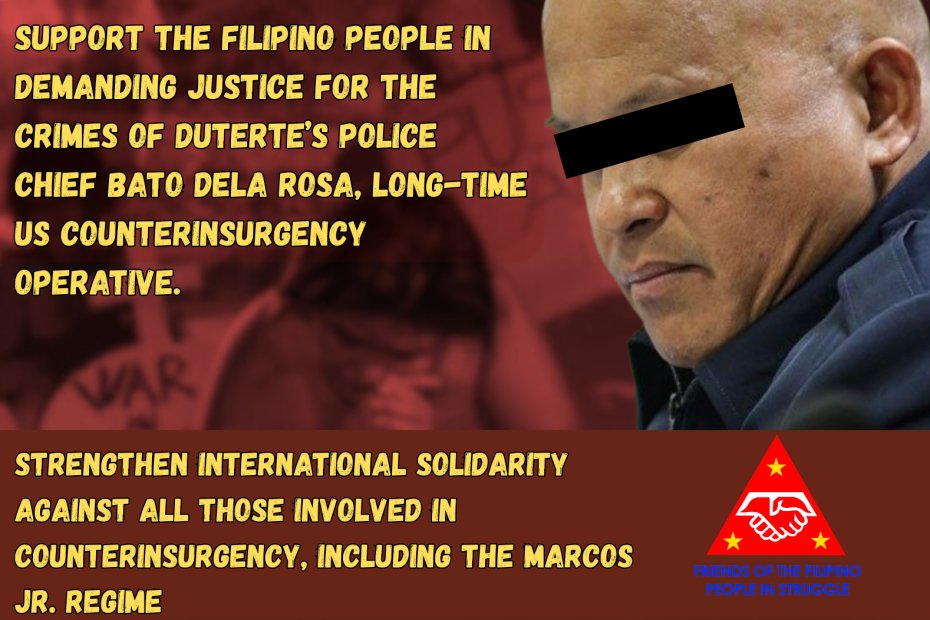Friends of the Filipino People in struggle join the Filipino people in welcoming the reports that the International Criminal Court (ICC) has issued an arrest warrant for Senator Ronald ‘Bato’ Dela Rosa due to his role in the killings of former President Rodrido Duterte’s so-called ‘War on Drugs’.
Dela Rosa was the head of the Philippine National Police during Duterte’s presidency and was the direct architect of many of the brutal policies which lead to what human rights groups estimate is over 30,000 deaths. On the first day of his appointment on July 1st 2016, he circulated a memo, officially launching the nationwide war on drugs, code named Project ‘Double Barrel’. This formalised and institutionalised mass killings with the state aim of the “neutralization of illegal drug personalities nationwide”. However, Dela Rosa also has a long track record of coordinating campaigns of mass killings and extrajudicial violence that predate Duterte’s presidency, dating back to the US-directed anti-communist counterinsurgency campaigns of the post-Martial Law period.
As a junior lieutenant in the Armed Forces of the Philippines stationed in Davao City in 1986, Dela Rosa was the handler of the armed anti-Communist paramilitary group and cult, the Holy Christian Crusaders, known as the ‘Tadtad’ (Filipino for ‘Chop Chop) for their practice of chopping the heads off of their victims. The Tadtads were known for brutal killings and grave human rights abuses on those they considered members of sympathisers of the New People’s Army (NPA) in Davao city. Rather than being ashamed of his role in these abuses, Dela Rosa still proudly boasts of his role directing the Tadtads. In 2020, shortly after the passing of the Anti-Terror Law by the US-Duterte regime directly targeting revolutionary and progressive forces in the country, Dela Rosa promoted his Anti-Communist credentials by posting an edited clip from the 1988 documentary film ‘A Rustling of the Leaves: Inside the Philippine Revolution’ (Dir. Nettie Wild). In this clip he shows his full awareness of a recent massacre committed by the Tadtads.
The Tadtads were just one group of many anti-communist paramilitary groups that the Philippine government used in their counter-insurgency campaign against the revolutionary forces, patterned after the US Counterinsurgency guide. These anti-communist paramilitary groups – the most well-known which being the Alsa Masa (Masses Rising) – also known as CAFGUs (Citizen Armed Force Geographical Unit) were institutionalised as a key part of the Philippine Government’s counter-insurgency strategy under the post-Martial law Aquino government. Due to the widespread human rights abuses by these paramilitaries, the GRP began to dismantle them in 1993, only to halt this process in 1996 – with many of these groups still playing important roles in the Government’s counter-insurgency strategy.
Not only did Dela Rosa have a specific and devastating role in the apparatus of terror under the US-Duterte regime, but the death squads that he played a role in overseeing in-part inspired the Davao Death Squad (DDS) that Duterte used to pursue his so-called ‘War on Drugs’ during his time as Mayor of Davao City. This strategy was applied nationwide when he became president in 2016.
This strategy – which had its origins in the anti-communist counter insurgency – influenced a new wave of anti-communist repression after Duterte unilaterally terminated peace talks with the National Democratic Front of the Philippines in November 2017. Like the ‘War on Drugs’, a new ‘whole of nation’ approach was taken as part of a renewed and reinvigorated the counter-insurgency program increased. Programs like the National Task Force for Ended Local Communist Armed Conflict (NTF-ELCAC) and the Anti-Terror law of 2020 brought terror to activists and communities ‘Red-Tagged’ as communists or communist sympathisers.
The recent International People’s Tribunal (2024) on exposed serious humanitarian abuses under this program – which have continued to this day under the Marcos Jr regime. Evidence of grave human rights abuses such wilful killing of civilians, use of indiscriminate acts of war like bombings and strafings, abduction, forced disappearances, torture, and extra-judicial killings were examined by the tribunal – which declared both the Duterte and Marcos Jr Regime ‘GUILTY’ of war crimes and grave abuses of international humanitarian law.
Anti-communist counterinsurgency operations in the Philippines are patterned after the US Counterinsurgency Guide and have been both directly and indirectly backed by the US. These operations have persisted from the post-Martial Law period through the US-backed Duterte regime and Dela Rosa, and continue to this day under the US-aligned Marcos Jr. administration.
After Duterte’s arrest by the ICC, the Marcos Jr regime sought to distance itself from the human rights abuses of his predecessor by introducing the NAP-UPD. Essentially a renaming of the ‘Whole of Nation’ approach to counter-insurgency, NAP-UPD continues to tag revolutionaries, legal democratic activists, and civilians as terrorists; promote fake ‘localised’ peace talks’ and surrenders; and continues the massive ramping up of military deployment in poor – particularly rural – communities, placing them in a state of de-facto martial law.
The prosecution of Duterte, and the reported arrest warrant wouldn’t have happened without the struggles of the victims and families of victims of their brutal regimes. We must meet this struggle by growing and deepening our international solidarity with those struggling for national and social liberation in the Philippines – from legal civilian activists at risk of red-tagging and harassment, to those Red Fighters who make the ultimate sacrifice so that the Philippines may one day be free.
To learn more about the NAP-UPD, read FFPS’s primer here.
To learn more in how this is affecting rural communities, see our reportback from the recent International Solidarity Mission.
Source: FFPS
